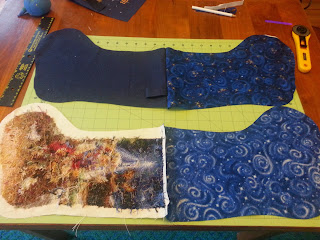 When we, Missouri-transplants of predominately German heritage, moved to Minnesota, Swedish and Scandinavian traditions were completely foreign. Lefse was an unknown word, lutefisk is still something that I refuse to try. My family's entire understand of Scandinavian customs came from the occasional listening to Prairie Home Companion and the Swedish Chef. While we loved the congregation we became members of, and which my parents are still faithful worshipers at, there were many ways those first few years in which we, the non-Swedes or Norwegians, were outsiders.
When we, Missouri-transplants of predominately German heritage, moved to Minnesota, Swedish and Scandinavian traditions were completely foreign. Lefse was an unknown word, lutefisk is still something that I refuse to try. My family's entire understand of Scandinavian customs came from the occasional listening to Prairie Home Companion and the Swedish Chef. While we loved the congregation we became members of, and which my parents are still faithful worshipers at, there were many ways those first few years in which we, the non-Swedes or Norwegians, were outsiders. Today, almost 20 years later, that Swedish Smorgasbord, still exist in my parents' congregation. The attendance has declined in recent years and there are very few people smorgasborders under the age of 50, even though on a typical Sunday, that demographic is strongly represented. Now there are many reasons for that including the lack of childcare, the event is on the pricey side, it is not a "come and go" event. But I believe one of the main reasons is that the event is so strongly tied to a specific cultural heritage.
Millennials and Gen Xers are more than willing to claim a cultural heritage when alcohol is involved, just look at a bar on any St. Patrick's Day or Cinco De Mayo or a beer garden at an Octoberfest. However in general everyday life, for Millenials and Gen Xers of European decent, it doesn't matter what your cultural heritage is. We no longer live in certain parts of a city because we are Italian, Irish, or Swedish. We no longer attend or are unwelcome at a specific congregation or even denomination because of what country our ancestors came from. We are just as likely to be able to eat, enjoy and cook good Italian food as we are German, Mexican or Thai. And for many of us, myself included, we are too many generations removed from our ancestors who came over from Europe that we have no particular ties to that cultural heritage or traditions. We were raised in a society that valued diversity, called our country the "great melting pot" and mashed together Christmas traditions from all cultural heritage.
So when something is advertised as a Swedish Smorgasbord or a Portuguese Festival, it almost always creates an "in-group" and and "out-group". The in-group knows what foods are served, what customs are maintained, and even what even happens at said event (it is not like the word smorgasbord is used in one's normal vernacular). And if you are part of the out-group, unless someone takes the time to personally invite and explain, you feel uninvited and unwelcomed because you were not born into the in-group.
Then why are churches still holding onto heritage festivals? Well some people really enjoy them, especially immigrants and children of immigrants as it reminds them of their childhoods. Then we need to realize that these events are not for all people, and cater the event for them and not complain that each year the age group is getting older and the number in attendance is getting smaller.
Or we can use these cultural heritage events as a foundation, take the best traditions from that event, do away with what is not working (really the world never needs to smell lutefisk again), and open up the event to include traditions from all those who are now represented in the congregation. Why can't lefse be served next to bangers and mash and a green curry and then have flan for dessert? Call the event a Christmas Festival.
Or again us the current event as a foundation, but use it as a teaching tool and specifically invite people to come and learn. Not come and be like us, but come and learn about one specific cultural heritage. Then do again next month or next year but focus on a different heritage. Though this would need to be a less formal and more of a give an take so people can ask questions about where a tradition comes from or why it is important a particular person.
Regardless of what a church does, can we please all agree to get rid of the lutefisk?






























